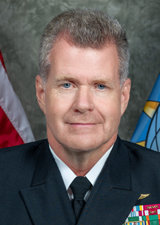Adm. Samuel Paparo: U.S. could move forward if S. Korea demands nuclear submarines
Adm. Samuel Paparo: U.S. could move forward if S. Korea demands nuclear submarines
Posted July. 15, 2024 07:39,
Updated July. 15, 2024 07:39

Adm. Samuel Paparo, the commander of the United States Indo-Pacific Command, made a statement that could potentially signal a shift in the US stance on South Korea's nuclear submarines. He said, “And if the operational analysis leads us to believe that (Korea’s introduction of nuclear submarines), then we can move forward at a later date.” This statement, which seemingly shows a shift in the US stance, was made by the top military leader responsible for missions across the Indo-Pacific area. The U.S. Indo-Pacific Command oversees US forces in South Korea and Japan, and supervises aircraft carriers and strategic bombers, which would be the first to be deployed in an emergency.
Asked about Adm. Paparo’s take on the rising voice for South Korea’s introduction of nuclear submarines in an interview with South Korean reporters last Thursday (local time) in Hickam Air Force Base, Hawaii, where the Indo-Pacific Command is located, he replied that Pyongyang’s growing nuclear capabilities are a big concern for everyone, adding, “From the standpoint of submarine warfare, I think it's important as allies and partners to find the most efficient and effective ways to combine our capabilities in ways that most effectively defend our alliances and partnerships” He seemingly intended to say that if it turns out that having nuclear submarines available in South Korea is the most effective and efficient way, Washington could move forward.
When U.S. Defense Secretary Lloyd Austin was asked last month at the Asia Security Conference in Singapore if he would say yes in a case where South Korea requests assistance in building nuclear submarines, he replied that as of now, Washington would find it hard to accept it, dismissing a possibility of South Korea getting equipped with nuclear submarines. It is interpreted that Washington took a seemingly slightly different stance as there have been growing tensions on the Korean peninsula since North Korea and Russia signed a deal to facilitate Russia’s military intervention in case of an emergency in the region.
Hyo-Ju Son hjson@donga.com
Headline News
- Joint investigation headquarters asks Yoon to appear at the investigation office
- KDIC colonel: Cable ties and hoods to control NEC staff were prepared
- Results of real estate development diverged by accessibility to Gangnam
- New budget proposal reflecting Trump’s demand rejected
- Son Heung-min scores winning corner kick







